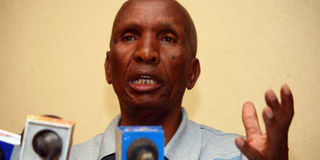Matatu association terms new instant fines a reprieve

Dickson Mbugua, the national chairman of the Matatu Welfare Association, in Nairobi on April 2, 2016. PHOTO | EVANS HABIL | NATION MEDIA GROUP
What you need to know:
Under the new regulations, motorists who flout traffic rules will be charged a maximum of Sh10,000 paid on the spot.
National Transport and Safety Authority Director-General Francis Meja says that motorists who do not have the money on them when they commit the offence “should make arrangements to pay the fines”.
- However, Matatu Welfare Association Dickson Mbugua says motorists should be given seven days to pay to courts or revenue collection centres.
Matatu officials on Wednesday termed the new instant fines for minor traffic offences a reprieve.
Under the new rules, motorists who flout traffic rules will be charged a maximum of Sh10,000 paid on the spot.
The Matatu Welfare Association Chairman Dickson Mbugua said the new fines were affordable and would reduce the time that offenders usually take on and off courtrooms.
This came as the National Transport and Safety Authority (NTSA) Director-General Francis Meja said that motorists who do not have the money on them when they commit the offence “should make arrangements to pay the fines”. “If you do not have the money when we get you flouting the rules, you call your friends or whoever can help you pay the fines. If not, then you go through the whole process,” Mr Meja told the Nation. The whole process means being taken to the traffic court to argue your case, a process that may drag for days.
However, Mr Mbugua said that motorists should be given a leave period of seven days to pay to courts or revenue collection centres.
INSTANT FINE
In the new rules, offenders, who include passengers, public service vehicles owners, drivers, conductors, pedestrians as well as motorcycle owners, will pay an instant fine ranging from Sh500 to Sh10,000 for various offences. “Offenders will pay in cash or through mobile money platforms and will be issued with a standard receipt on the spot,” said Mr Meja.
Those who deny the offence, Mr Meja said, will be given a date with the traffic court by the more than 300 officers who have been seconded to the authority. “These officers seconded to NTSA must be beyond reproach lest we go back to where we were: the era of bribes,” said Mr Mbugua.
The government hopes to bring sanity to the roads, reduce corruption as well as the time taken to punish errant drivers and passengers.
Mr Mbugua said the new penalties are cheaper and will be convenient for motorists who do not want to waste time when they flout the traffic rules.
He said the previous fines and processes that required motorists to wait for days to pay huge penalties in courts had bred corruption culture.
‘GOOD THING’
“The instant fines are a good thing. We have been crying for a system that encourages motorists and operators to pay their fines to the courts,” said Mr Mbugua. But he said that the NTSA should set up measures to ensure that there are no revenue leaks in the system. “Let us have the receipts serialised so that it will not be easy to fake or forge, because the next big assignment for NTSA is ensuring that corruption is kept as far away from the new system as possible,” said Mr Mbugua.
The fines were proposed by the NTSA, and were gazetted by Transport Cabinet Secretary James Macharia.
On Wednesday, Kenyans on social media were divided on the effect of the new fines, but many supported the amount of time the fines might save offenders. However, they all warned that corruption loopholes must be closed.
“Good news. Instant fines for motoring offenders in Kenya. Will end this ‘roadside bribe culture’ for cops and drivers,” Ben Roberts tweeting as @benliquidkenya said.
On Facebook, Batiany Arap Kenya said: “Very good. No more breakdowns waiting at roundabouts and police waking up at 6.30am abandoning their posts, when you call to report thugs, there are no police, most have gone to hide in bushes to await bribe from overspeeding (sic).”
But Pat Njuguna, another Facebook user, was apprehensive of the proposal. “I don’t see how this is going to stop our corrupt traffic officers. You are unlikely to hear of any PSV operators who have been nabbed but you will read of a lot of complaints from private motorists who have suffered selective use of the rules,” he said.





